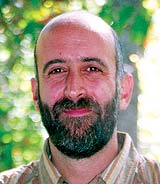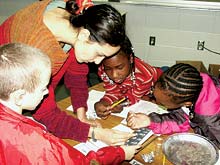Educator of the year sets a green standard
According to the Environmental Educators of North Carolina Web site, an individual who garners the organization’s Environmental Educator of the Year award is “a ‘dynamo’ that other environmental-education practitioners strive to emulate.”

This year’s dynamo is Stan Cross, education director at Warren Wilson College’s Environmental Leadership Center. The ELC is a department of the college that strives to “inspire and educate folks, especially youth, to be effective communicators and leaders on environmental issues,” says Cross.
While Cross heads up a variety of programs designed to bring a greater environmental awareness to everyone from 10-year-olds to developers from around the world, he says working with youth can be most rewarding, as it allows him “a respite from the heavy stuff.”
An ELC program called the EcoTeam, which has been in existence for nine years, reaches some 1,500 Buncombe County elementary-school students each academic year—roughly 70 percent of the third-graders in the county. Through the program, Warren Wilson students go into Buncombe County classrooms to lead one-hour lessons on the land over a course of 10 weeks. “The curriculum is focused on the French Broad River basin,” notes Cross. “Its goal is to raise appreciation among third-graders for this amazing bioregion.”
The EcoTeam program provides a more in-depth study of earth sciences than is typically offered in the public school system, says Cross. And its influence has grown beyond Buncombe County: The program has been replicated at 13 other institutions of higher education around the country.

Warren Wilson is no stranger to accolades. It was recently named one of the top three climate-friendly institutions in the country by the Sierra Club, following Oberlin College and Harvard University. Highlighting green-design features like energy-efficient dorms, innovative wastewater-management systems and sustainable agriculture, Cross has turned the campus itself into a classroom for the wider community, through an ELC program called the Green Walkabout.
“The goal of the Green Walkabout is to bring people to campus to give them a chance to see what we’ve put into practice,” Cross explains. Exposing people to, for instance, buildings that are made with sustainably harvested lumber, recycled materials and passive-solar design, he believes, can inspire others to implement similar practices. Approximately 700 people have taken the campus tour, including real-estate professionals, developers, businesses, educators and university representatives from around the world, Cross says. “We in the ELC came to the realization that we’re only going to really see the kind of change we want to see … if we bring all the stakeholders to table,” he notes.
The efforts of the ELC may also provide environmental guidance for the city of Asheville. In August, Asheville Mayor Terry Bellamy and Warren Wilson College President Sandy Pfeiffer signed a partnership agreement to work together to address climate change. The ELC is managing the college’s relationship with the city, according to Cross, by providing interns, doing research and hosting a lunch series to educate decision-makers and developers on green-design principles.
Final IPCC report released
The final Intergovernmental Panel on Climate Change report was released Nov. 17, signifying the most strongly worded release to date on the potentially catastrophic effects of climate change. The report, which synthesizes the findings of a pre-eminent body of scientists from around the world, is the last that will be released for five years.
Ten scientists from North Carolina, including David Easterling, Byron Gleason, Pasha Groisman, Tom Karl, David Levinson, Jay Lawrimore, Thomas Peterson, Russell Vose, and David Wuertz from Asheville’s National Climatic Data Center contributed extensively to the IPCC findings. They are among the 2,000 scientists who shared a Nobel Peace Prize in October for their contributions to the field of climate science through these assessment reports.
“This year’s IPCC reports offer three conclusions: Global warming is caused by human activity, it is already affecting our environment and we have the resources we need to avoid the worst consequences,” noted Stephen Smith, executive director of the Southern Alliance for Clean Energy. “This is the first time there has been international scientific consensus, and this report should be the ‘how to’ guide for local, national and world leaders addressing climate change.”



Hi Rebecca:
Hey Rebecca, you forgot my husband when you talked about the scientists who worked on the IPCC. You said 10 and had 9. The tenth is Lenny Bernstein. He’s a convening lead author.
And me, I write the hiking column inthe Mountain Xpress.
My apologies, Danny and Lenny Bernstein. According to the press release I received, there were 10 scientists from N.C. including the 9 NCDC scientists I named and Gabriele Hegerl from Duke University in Durham, so I hadn’t realized that I omitted anyone. Congratulations, Lenny, for being part of such a critical effort.